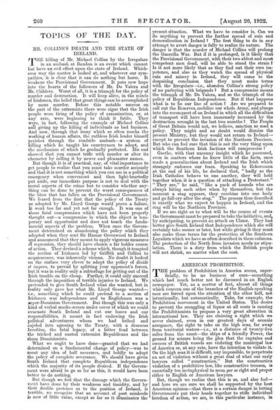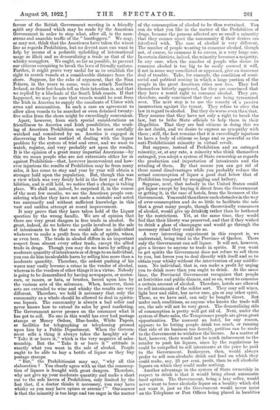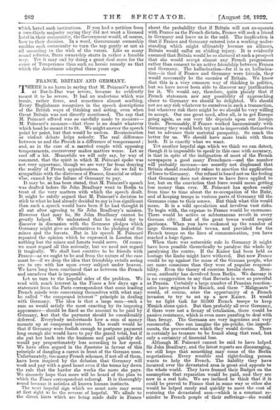AMERICAN PROHIBITION.
T'problem of Prohibition in America seems, super- ficially, to be no business of ours—something which had much better not be discussed in an English newspaper. Yet, as a matter of fact, almost all things which concern one of the branches of the English-speaking race are forced upon the attention of the other half, not intentionally, but automatically. Take, for example, the Prohibition movement in the United States. The desire to prevent the smuggling of liquor at all costs is causing the Prohibitionists to propose a very great alteration in international law. They are claiming a right which we never claimed, even in our greatest days of oceanic arrogance, the right to take on the high seas, far away from territorial waters--i.e., at a distance of twenty-five miles from the coast—the ships of a friendly Power, the ground for seizure being the plea that the captains and owners of British vessels are violating the municipal law of America or, at any rate, have the intention to violate it. On the high seas it is difficult, nay impossible, to perpetrate an act of violation without a great deal of what our early lawyers called "construction." But the constructive violation of a prohibitive law, like constructive treason, is essentially too metaphysical to seem per se right and proper either to English or American lawyers. But, though we realize that this is so, and also f eel— and here we are sure we shall be supported by the best American opinion—that there is a certain danger in letting Governments put their heads together to stifle individual freedom of action, we are, in this particular instance, in favour of the British Government meeting in a friendly spirit any demand which may be made by the American Government in order to stop what, after all, is the mon- strous and anarchic traffic of the "bootleggers." We may, or may not, think that the Americans have taken the wisest line as regards Prohibition, but no decent man can want to help by means of a pedantic upholding of international usage so illicit and so demoralizing a trade as that of the whisky smugglers. We ought, so far as possible, to prevent our citizens conspiring to break the laws of friendly nations. Further, it might prove very useful for us to establish the right to search vessels at a considerable distance from the shore. Suppose, for the sake of argument, that the Sinn Feiners, in the years to come, were to attack Northern Ireland, as their hot-heads tell us their intention is, and that we replied by a blockade of the South Irish coasts. If that happened, we may be sure that vessels would be sent from the Irish in America to supply the assailants of Ulster with arms and ammunition. In such a case an agreement to allow alien vessels to be searched or even detained twenty- five miles from the shore might be exceedingly convenient.
Apart, however, from such special considerations as friendliness to America and Irish possibilities, the work- ing of American Prohibition ought to be most carefully watched and considered by us. America is engaged in discovering the best method of dealing with the liquor problem by the system of trial and error, and we want to watch, register, and very probably act upon the results. It is the opinion of a great many impartial Americans—by this we mean people who are not extremists either for or against Prohibition—that, however inconvenient and how- ever injurious the results of Prohibition may be from many sides, it has come to stay and year by year will obtain a stronger hold upon the population. But, though this was a view which was very firmly held in the first year of Pro- hibition, and is still held, we notice that a change is taking place. We shall not, indeed, be surprised if, in the course of the next few months, we see the American people con- sidering whether they have not made a mistake and acted too summarily and without sufficient knowledge in this vast and sudden attempt at moral improvement. It may prove that they have taken hold of the Liquor question by the wrong handle. We are of opinion that there are very great dangers in free trade in alcohol. So great, indeed, do we believe the perils involved in the sale of intoxicants to be that we would allow no individual whatever to make a profit from the sale of spirits, wines, or even beer. The trade in alcohol differs in an important respect from almost every other trade, except the allied trade in drugs. Though you may do no harm by selling a moderate quantity of intoxicants or of drugs to an individual, you can do him incalculable harm by selling him more than a moderate quantity. Therefore, the ardent pushing of his wares may easily become a crime in the vendor of alcohol, whereas in the vendors of other things it is a virtue. Nobody is going to be demoralized by having newspapers, or motor- cars, or razors, or hats, or brushes, forced upon him by the various arts of the salesman. When, however, those arts are extended to wine and whisky the results are very different. Therefore, we hold it necessary that only. the community as a whole should be allowed to deal in spiritu- ous liquors. The community is always a bad seller and never knows how to extend its sales by good marketing. The Government never presses on the consumer what it has got to sell. No one in this world has ever had postage stamps or Money Orders, Blue-books, White 'Papers, or facilities for telegraphing or telephoning pressed upon him by a Public Department. When the Govern- ment sells a thing it always takes the haughty air of "Take it or leave it," which is the very negative of sales- manship. But the "Take it or leave it" attitude is exactly what you want in the sale of alcohol. People ought to be able to buy a bottle of liquor as they buy postage stamps. "But," the Prohibitionist may say, "why all this elaboration ? You clearly agree with us that the consump- tion of liquors is fraught with great dangers. Therefore, why not give up your moderate quantity and make a short cut to the safe haven of Prohibition, only limited by the fact that, if a doctor thinks it necessary, you may have whisky as you may have opium or arsenic?" Our answer is that the minority is too large and too eager in the matter of the consumption of alcohol to be thus restrained. You can do what you like in the matter of the Prohibition of drugs, because the peraons affected are so small a minority that they caimot upset the community if their desires are interfered with. The case of alcohol is very different. The number of people wanting to consume alcohol, though not, of course, to consume it to excess, is a very large one, In certain districts, indeed, the minority becomes a majority. In any case, when the number of people who desire to consume alcohol is too big to be easily coerced it will, if not in some way conciliated or appeased, give an immense deal of trouble. Take, for example, the condition of semi- social and political mutiny in which a large portion of the people in the great American cities now live. They feel themselves bitterly aggrieved, for they are convinced that they have a moral right to consume alcohol. They are, therefore, easily con-Vinced that they are being tyrannized over. The next step is to use the remedy of a passive insurrection against the tyrant. They refuse to obey the law in regard to alcohol. But they do worse even than that. They assume that they have not only a right to break the law, but to bribe State officials to help them in their illegalities. That they are bad citizens in doing this we do not doubt, and we desire to express no sympathy with them ; still, the fact remains that it is exceedingly injurious to have a body of citizens so large and so powerful as the anti-Prohibitionist minority in virtual revolt.
But suppose, instead of Prohibition and an outraged minority, or, at any rate, a minority who think themselves outraged, you adopt a system of State ownership as regards the production and importation of intoxicants and the retailing of them. By that means you can get rid of these moral disadvantages while you probably reduce the actual consumption of liquor a good deal below that of Prohibition tempered by smuggling and bribery. Suppose, next, that nobody in the United States could get liquor except by buying it direct from the Government or getting it, in the case of hotels, from the licensees of the Government. You could then throw such obstacles in the way of over-consumption and do so little to facilitate the sale that a great many people' though theoretically consumers of alcohol, would give up drinking rather than be bothered by the restrictions. Yet, at the same time, they would feel that their liberty was preserved, and that if they wished to drink a glass of champagne and would go through the necessary ritual they could do so. A very interesting experiment in this respect is, we understand, being tried in the Province of Quebec. There only the Government can sell liquor. It will not, however, give a licence to anyone to trade in spirits. If you want to get spirits the Government does not refuse to sell them to you, but forces you to deal directly with itself and so to obtain your whisky without the intervention of any middle- man. No individual, that is, can make a profit by urging you to drink more than you ought to drink. At the same time, the Provincial Government recognizes that people at festivities and public dinners, and so on, want to consume a certain amount of alcohol. Therefore, hotels are allowed to sell intoxicants of the milder sort. They may sell wines, light beer and cider, but never rum, gin or any other spirit. These, as we have said, can only be bought direct. But under such conditions, as anyone who knows the trade will see, the sale will not be very great. The demoralizing side of consumption is pretty well got rid of. Next, under the system of State sales, the Temperance people are given great opportunities. The moment an hotel, for any reason, appears to be letting people drink too much, or running that side of its business too fiercely, petition can be made to the Government to withdraw the licence. As a matter of fact, however, there would not be much inducement to the retailer to push his liquors, since by the regulations he could be compelled to sell intoxicants at the price he paid to the Government. Innkeepers, then, would always prefer to sell non-alcoholic drink and food on which they could make, say, 25 per cent, profit, than to sell alcoholic liquors on which they could make nothing. Another advantage in the system of State ownership in respect to drink is that it would bring about automatic local option. The Government, being a lazy seller, would never want to force alcoholic liquor on a locality which did not want it, just as the Government would never insist on the Telephone or Post Offices being placed in localities which hated such institutions. If you had a petition from a two-thirds majority saying they did not want a licensed hotel in their community, the Government would, of course, bow to their decision. Th a. word, Government ownership enables each community to turn the tap gently or not at all according to the wish of the voters. Like so many sound reforms, State ownership starts in rather a humble way. Yet it may end by doing a great deal more for the cause of Temperance than such an heroic remedy as that which the Americans adopted • three years ago.




































 Previous page
Previous page